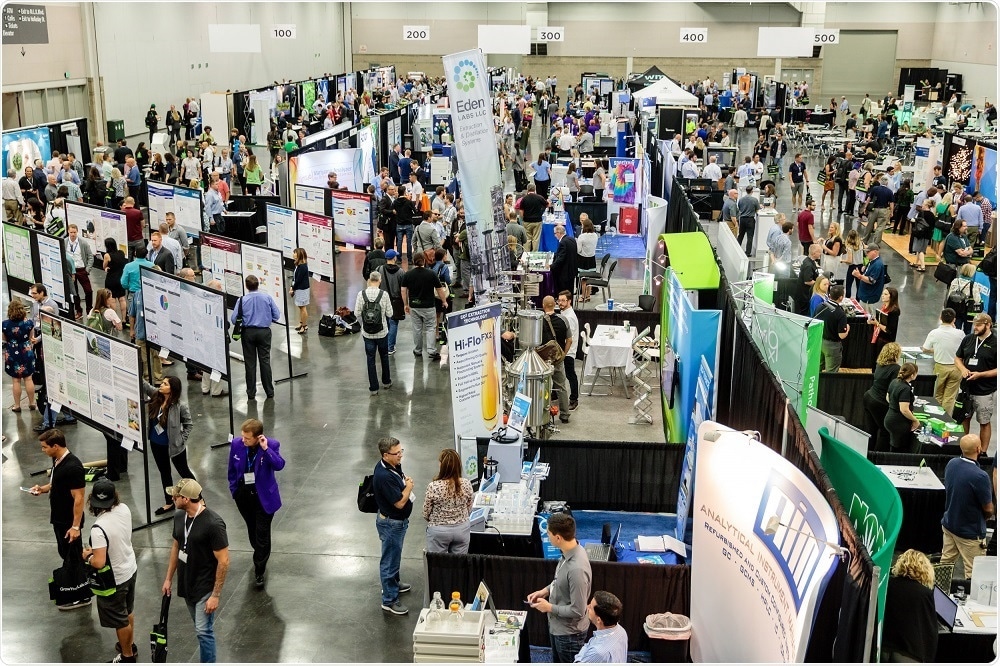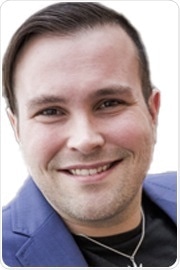Sponsored Content by PittconJun 10 2019
An interview with Joshua Crossney, who wants to bring together analytical scientists with the medical cannabis community.
How is the cannabis industry changing?
The cannabis industry is changing every year, and we're seeing more acceptance of the industry over time. It is unfortunate in the US, given the federal scheduling and status of cannabis, it is a Schedule 1 drug, making it difficult to advance in things like cannabis research.
We're seeing more countries legalize cannabis, such as Canada that's just legalized it on a complete countrywide level for recreational use, and the country of Colombia and Australia have both completely legalized it for medical purposes.
I remember the first time I was at Pittcon walking the floor, talking about cannabis, trying to see who was interested, and the interest was very low indeed. Then the next year, it built up a little bit more, and then built up a little bit more, until now four years on, we're here and it’s great to see the level over excitement surrounding the industry.
Cannabis and Analytical Chemistry
Cannabis and Analytical Chemistry from AZoNetwork on Vimeo.
I'm excited for the future, to see how we continue to innovate and grow this industry and the acceptance. Our mission is to end the stigma and prohibition surrounding the cannabis industry as much as possible. We're all about connecting the analytical experts with the cannabis community and merging the two together. The people that have been cultivating and dealing with this plant for years, have a lot of information to offer analytical experts, scientists and doctors, and vice versa. We want to create a platform to bridge those gaps and bring those individuals together.
Please outline the relationship between analytical sciences and the medical cannabis industry.
In the cannabis industry, you often see that you have analytical experts who know the available instrumentation like the back of their hand, but when you talk about the applications with cannabis, they're not too sure how it's being used and how the instrumentation comes into play. There is deep importance in being able to educate on this.
In the past few years, we’ve seen an increase in the involvement of analytical support for the medicinal cannabis industry. We're seeing new labs open all around the world, and great involvement from companies like Shimadzu, PerkinElmer, Waters and many other instrument manufacturers, sample prep providers, accreditation services, and even ancillary businesses.

Exhibition floor at The Cannabis Science Conference.
Analytical experts are going to play a big role in the future of the cannabis industry, especially when things continue to move forward and we see some change on the way cannabis stands federally.
What techniques are particularly useful in cannabis science?
We're seeing a lot of different instrumentation and techniques being used, and the interesting thing is that it's not completely standardized; there are no standard methods outlined for cannabis testing. We're still working on that, and there's a lot of great groups that are working on trying to implement those.
Without the standardization, you have issues with being able to replicate the results from lab to lab, or even inner lab replication. We’re seeing several different analytical techniques being more widely accepted and implemented in cannabis potency testing; such as HPLC, near infrared spectroscopy, GC, GCMS, ICPM, to name a few. So, there are a lot of techniques and technologies that are useful in cannabis science, it’s just trying to figure out what the best thing that works is.
Sample preparation plays a big role in the conversation and I think that throws off some analytical chemists sometimes, because cannabis is not just one form. You have the flower, or the bud of the cannabis plant, then, there's also many different other forms and consistencies that you can turn cannabis into, like oils or edibles.
For each one of those different forms, it's a different sample preparation process, and maybe even a different suggested testing process. It’s important to focus our efforts on defining standard sample preparation methods and analytical techniques. I believe that we will be able to identify the industry gold standard by helping to facilitate platforms to further industry discussions.
How are these techniques used to test or improve the quality of medicinal cannabis products?
Potency screening is important because we have so many different strains of cannabis, and they all work differently. We’re starting to identify that particular strains tend to work better for treating different symptoms or conditions compared to others.
Just as important as the accurate potency labeling for the different cannabinoids, whether it’s THC or CBD, etc, there’s also contamination screening. We work very closely with pediatric patients suffering from conditions like cancer and who are going through chemotherapy and radiation. When you are dealing with an immunocompromised population, it's crucial that the quality of medicine that they're receiving is safe and effective. I always say that although cannabis is inherently safe as a plant medicine, there are things that can cause contamination which then may make it potentially harmful.
Pediatric patients will be ingesting the cannabis through oils or pills, rather than smoking it. The medicinal cannabis will go through an extraction process, which then brings in a whole new conversation regarding safety. If you put a contaminated cannabis sample through an extraction process, you might not only extract the cannabinoids to a more potent level, but if it is contamination present, you could also extract that to a more potent level, which could be dangerous.
What are the current barriers in place which limit research involving cannabis samples?
In the US, the biggest barrier to cannabis research is the fact that cannabis is a Schedule 1 drug. Cannabis is scheduled in the Dangerous Controlled Substance Act next to heroin.
We work with a great researcher called Dr. Sue Sisley, from the Scottsdale Research Institute, who has worked really hard to earn a Schedule 1 research license. Some of her work has involved studying smoked cannabis with PTSD veterans, to see if it would help or harm the symptoms.
 Fran Drescher delivering her keynote address at the Cannabis Science Conference.Even with this licence, there’s restrictions on the cannabis samples that can use for the research. For example, Dr Sisley was forced to use cannabis samples that were nothing really like what exists on the market as medicinal cannabis. The University of Mississippi is the only entity that has a Schedule 1 research license to cultivate cannabis for medical research, and that is being issued by the National Institute of Drug Abuse.
Fran Drescher delivering her keynote address at the Cannabis Science Conference.Even with this licence, there’s restrictions on the cannabis samples that can use for the research. For example, Dr Sisley was forced to use cannabis samples that were nothing really like what exists on the market as medicinal cannabis. The University of Mississippi is the only entity that has a Schedule 1 research license to cultivate cannabis for medical research, and that is being issued by the National Institute of Drug Abuse.
Please introduce the ideas behind your talk at Pittcon 2019 titled “Building Bridges: Cannabis Science Education and Medical Reform”.
Our aim is to try to bring together the analytical experts with the medical cannabis community and the cultivation community. I believe that they should all be working synergistically with each other, as they have different pieces of knowledge that can benefit the other group.
At Pittcon 2019, I was able to share this message and show some data about how the research has evolved, and how collaborations have come together over the past few years that we at the Cannabis Science Conference, have been able to be a part of and be involved with.
Why is there a need to educate and inform people about the evolving cannabis industry?
With the cannabis industry, there are different facets of education that are important in order to advance the industry. We’ve talked about analytical science education being particularly important, but I equally think patient education must be considered. With any medicinal product, it's good for patients to know what they're using, if it's helping them and why, etc.
Physician and doctor education is also very important, because we're still not seeing cannabis being taught to student doctors in their traditional education programmes. They’re having to come to events like Pittcon in order to keep up to speed with the latest findings in therapeutic cannabis. It's a shame because a lot of doctors are really interested in learning more, but the educational resources are not currently easily available.
Why is Pittcon important for people involved in cannabis research?
I see Pittcon as a leader in analytical science and we’re honored to have been invited back year after year to do our Analytical Cannabis Symposium.
It’s great to see that Pittcon are implementing the education that we need to improve the cannabis industry and provide a perfect platform to build the bridge between cannabis science education and medical reform.
I also love being at Pittcon because it’s a place where we get to connect with a lot of our vendors from our conferences that are here. Many of them have been involved with Pittcon for many, many years and recognise Pittcon as a great place to be in learning more about how the cannabis industry is evolving.
About Joshua Crossney
 Joshua Crossney is the CEO & Founder of CSC Events, LLC., which hosts and operates the world’s largest semi-annual Cannabis Science Conference (www.CannabisScienceConference.com), including a Canna Boot Camp (a full-day, hands-on workshop that covers many aspects of cannabis science). Additionally, Joshua is the organizer of an annual, full-day Analytical Cannabis Symposium at PITTCON (www.PITTCON.org), one of the world’s largest analytical science conferences.
Joshua Crossney is the CEO & Founder of CSC Events, LLC., which hosts and operates the world’s largest semi-annual Cannabis Science Conference (www.CannabisScienceConference.com), including a Canna Boot Camp (a full-day, hands-on workshop that covers many aspects of cannabis science). Additionally, Joshua is the organizer of an annual, full-day Analytical Cannabis Symposium at PITTCON (www.PITTCON.org), one of the world’s largest analytical science conferences.
Joshua Crossney is also the President & Founder of jCanna, Inc., a 501(c)3 non-profit organization devoted to the advancement of cannabis science, analytical testing, and personalized (precision) medicine. Joshua has a background in analytical science recruiting and event planning. He is doing his best to bridge the gap between analytical sciences and the medical cannabis industry to help improve the quality of medicinal cannabis products being used by patients. The lack of unified methods and standards for contamination and potency in cannabis testing and the fact that some states don’t even require QC/QA testing for their medical cannabis programs was very troubling to Joshua. This led him to found jCanna. Joshua is especially passionate about helping pediatric cannabis patients suffering from debilitating illnesses.
Joshua is an Advisory Board member of CannaKids, a California Cooperative who supplies mold, pesticide and solvent free Honey Gold cannabis oil to children and adults who are suffering from cancer, autism, epilepsy, PTSD, Crohn’s disease, severe pain disorders, and so much more. Joshua has a motto of collaboration, not competition in this emerging medical industry where so much still needs to be accomplished.
Before entering the cannabis industry, Joshua was a recruiter for the analytical science community, placing many candidates in a wide variety of positions. He also has an extensive background of planning large scale events, including weddings, galas and fundraisers.
Joshua is an active member of the LGBTQ community, and a voice for equal rights worldwide. He often speaks out about diversity inclusion in the cannabis industry, including equality of race, gender, sexual orientation and economic/social standing.
About Pittcon
 Pittcon® is a registered trademark of The Pittsburgh Conference on Analytical Chemistry and Applied Spectroscopy, a Pennsylvania non-profit organization. Co-sponsored by the Spectroscopy Society of Pittsburgh and the Society for Analytical Chemists of Pittsburgh, Pittcon is the premier annual conference and exposition on laboratory science.
Pittcon® is a registered trademark of The Pittsburgh Conference on Analytical Chemistry and Applied Spectroscopy, a Pennsylvania non-profit organization. Co-sponsored by the Spectroscopy Society of Pittsburgh and the Society for Analytical Chemists of Pittsburgh, Pittcon is the premier annual conference and exposition on laboratory science.
Proceeds from Pittcon fund science education and outreach at all levels, kindergarten through adult. Pittcon donates more than a million dollars a year to provide financial and administrative support for various science outreach activities including science equipment grants, research grants, scholarships and internships for students, awards to teachers and professors, and grants to public science centers, libraries and museums.
Visit pittcon.org for more information.